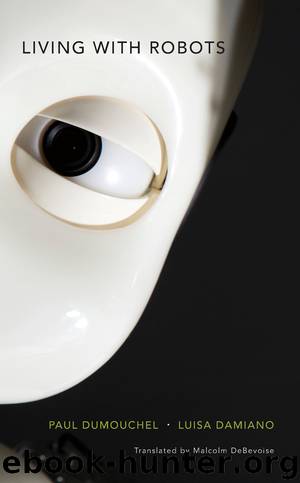Living with Robots by Paul Dumouchel & Luisa Damiano

Author:Paul Dumouchel & Luisa Damiano
Language: eng
Format: epub
Publisher: Harvard University Press
Radical Embodiment and the Future of the Social Robotics of Emotion
The idea that the nature of affective relations needs to be reconsidered, and the dynamic of emotions and empathy analyzed in a novel way, has found support in the so-called radical embodiment approach in philosophy of mind and cognitive science. Radical embodiment rejects the extended mind hypothesis, even where its “extension” includes social and intersubjective factors among the external resources on which an agent draws in order to carry out a cognitive task.13 The radical approach to embodiment proposes a much more revolutionary redefinition of the borders of the mind, freeing it from the spatial dimension within which the debate over extended cognition has confined it up until now.14
Radical embodiment, particularly in the enactive version originally developed by Francisco Varela,15 distinguishes itself not only from the classically dominant tendency in cognitive science, but also from the moderate versions of the embodied mind thesis that seat it in the brain and then extend it, in an ad hoc fashion, outside the intraindividual space. Enaction holds that the mind is situated in—or, rather, arises from—the complex regulative dynamic through which the agent’s nervous system couples her body and her environment and thus makes cognition and knowledge of environmental context and of others possible. The radically embodied mind is not a spatial entity in the Cartesian sense of a res extensa. It is the result of a dynamic coupling that is irreducible to the classical alternative, inherited from Descartes, between an unextended immaterial substance and extended matter. Because it emerges from a process of reciprocal specification that connects the agent’s nervous system with her body and her environment, the mind escapes the spatial framework that any disjunction between internal and external, or between organism and environment, cannot help but assume. The mind emerges, in other words, from a process of coevolution whose imbricated structure inevitably locates mind in the world, and vice versa.16
The radical embodiment approach involves more than merely adopting an abstract and speculative theoretical stance at odds with the classical computational conception of a “naked mind” that would be identically implementable in very different materials—as long as a certain “functional equivalence” is preserved between these various “realizations” of the mind. The sheer unreality of the computational conception will be apparent if one considers what a naked mind really implies: take away the body, the environment, and other agents, and all cognitive processes inevitably come screeching to a halt. Modeling and exploring cognitive phenomena become impossible. Contemporary synthetic models of artificial agents, based on the inseparability of brain, body, environment, and other cognitive systems with which agents interact, illustrate the fruitfulness of radical embodiment as a methodological principle. In contrast with a purely hypothetical naked mind, these agents can be designed and actually constructed as recursive systems that perpetually determine and modify one another’s state.17
Radical embodiment does a better job than the extended mind hypothesis in explaining why Otto would have chosen, as surely he must have done, to get to the Museum of Modern Art by hailing a taxi and asking the driver to take him there.
Download
This site does not store any files on its server. We only index and link to content provided by other sites. Please contact the content providers to delete copyright contents if any and email us, we'll remove relevant links or contents immediately.
Enlightenment Now: The Case for Reason, Science, Humanism, and Progress by Steven Pinker(7306)
A Journey Through Charms and Defence Against the Dark Arts (Harry Potter: A Journey Through…) by Pottermore Publishing(4798)
The Immortal Life of Henrietta Lacks by Rebecca Skloot(4571)
A Journey Through Divination and Astronomy by Publishing Pottermore(4378)
Elon Musk by Ashlee Vance(4120)
Origin Story: A Big History of Everything by David Christian(3680)
COSMOS by Carl Sagan(3617)
Alchemy and Alchemists by C. J. S. Thompson(3513)
Bad Pharma by Ben Goldacre(3420)
Enlightenment Now by Steven Pinker(3365)
Shadow of Night by Deborah Harkness(3356)
Inferior by Angela Saini(3311)
A Mind For Numbers: How to Excel at Math and Science (Even If You Flunked Algebra) by Barbara Oakley(3294)
Origin Story by David Christian(3194)
The Code Book by Simon Singh(3177)
Signature in the Cell: DNA and the Evidence for Intelligent Design by Stephen C. Meyer(3125)
The Elements by Theodore Gray(3050)
A Brief History of Time by Stephen Hawking(3022)
A Journey Through Potions and Herbology (A Journey Through…) by Pottermore Publishing(2844)
